Page 7 of 476
7
Tires
●Rotation
● Replacement
● Inflation pressure
● Information
P. 330
P. 393
P. 431
P. 437
Trunk P. 46
Fuel filler door P. 74
Rear turn signal lights P. 140
Stop/tail and rear side marker lights
P. 155
: If equipped
Doors P. 40
Page 10 of 476
10
Gauges and meters
Multi-information display P. 143
P. 151
Tilt and telescopic
steering control lever
P. 64
Pictorial index
Trunk opener P. 46
Headlight switch
Turn signal lever
Fog light switch
P. 155
P. 140
P. 157
Instrument panel
Audio system
Navigation system *P. 202
Windshield wiper and washer switch P. 158
Hood lock release
lever
P. 309
Fuel filler door opener
P. 74
Emergency flasher switch
P. 372
Shift lock override
button
P. 406
Cigarette lighter
Power outlet
Ashtray
P. 280
P. 281
P. 279
Tire pressure warning
reset switch
P. 331
Horn P. 142
Page 294 of 476
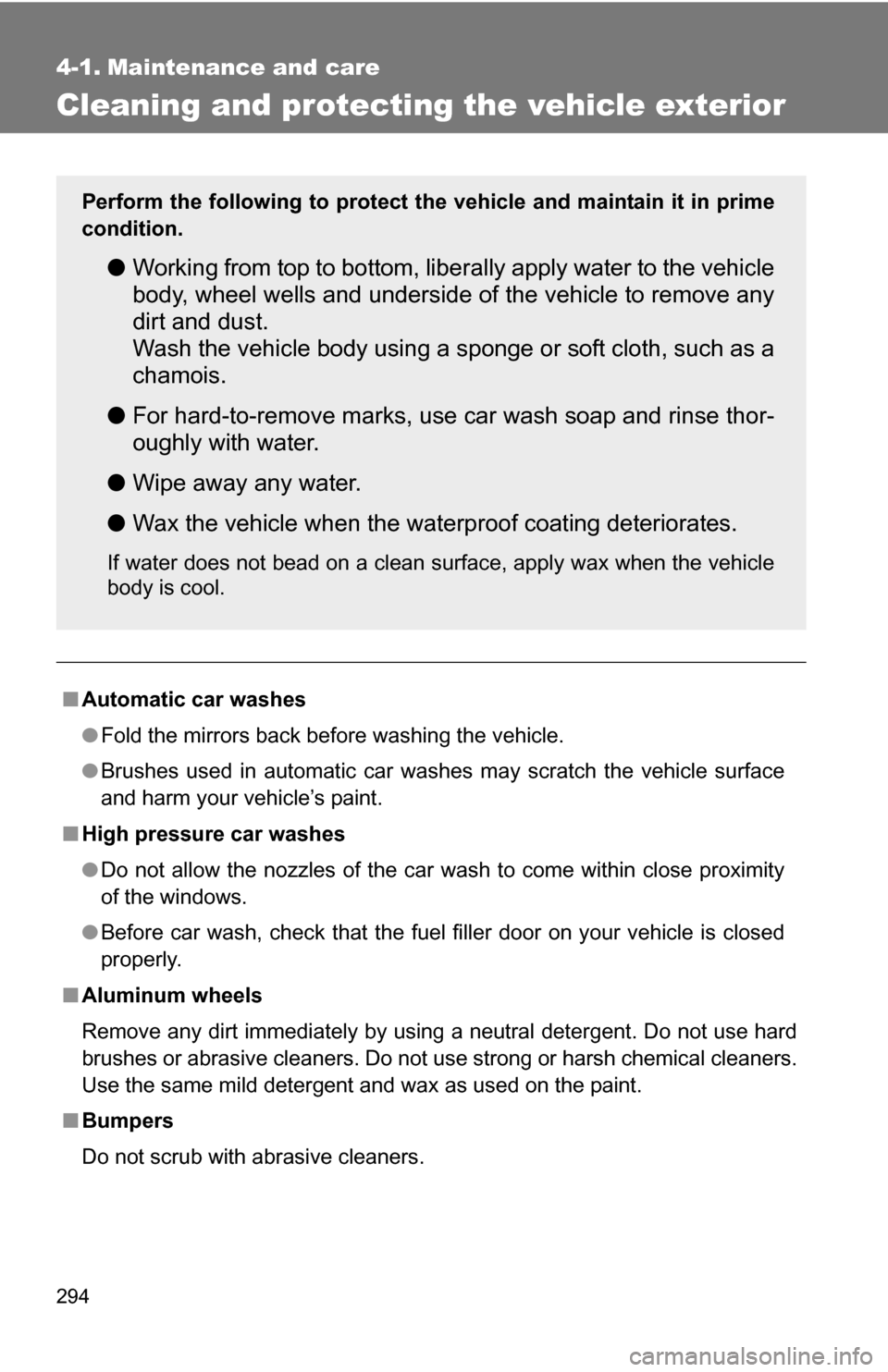
294
4-1. Maintenance and care
Cleaning and protecting the vehicle exterior
■Automatic car washes
●Fold the mirrors back before washing the vehicle.
● Brushes used in automatic car washes may scratch the vehicle surface
and harm your vehicle’s paint.
■ High pressure car washes
●Do not allow the nozzles of the car wash to come within close proximity
of the windows.
● Before car wash, check that the fuel filler door on your vehicle is closed
properly.
■ Aluminum wheels
Remove any dirt immediately by using a neutral detergent. Do not use har\
d
brushes or abrasive cleaners. Do not use strong or harsh chemical cleaners.
Use the same mild detergent and wax as used on the paint.
■ Bumpers
Do not scrub with abrasive cleaners.
Perform the following to protect the vehicle and maintain it in prime
condition.
● Working from top to bottom, liber ally apply water to the vehicle
body, wheel wells and underside of the vehicle to remove any
dirt and dust.
Wash the vehicle body using a sponge or soft cloth, such as a
chamois.
● For hard-to-remove marks, use car wash soap and rinse thor-
oughly with water.
● Wipe away any water.
● Wax the vehicle when the waterproof coating deteriorates.
If water does not bead on a clean surface, apply wax when the vehicle
body is cool.
Page 340 of 476
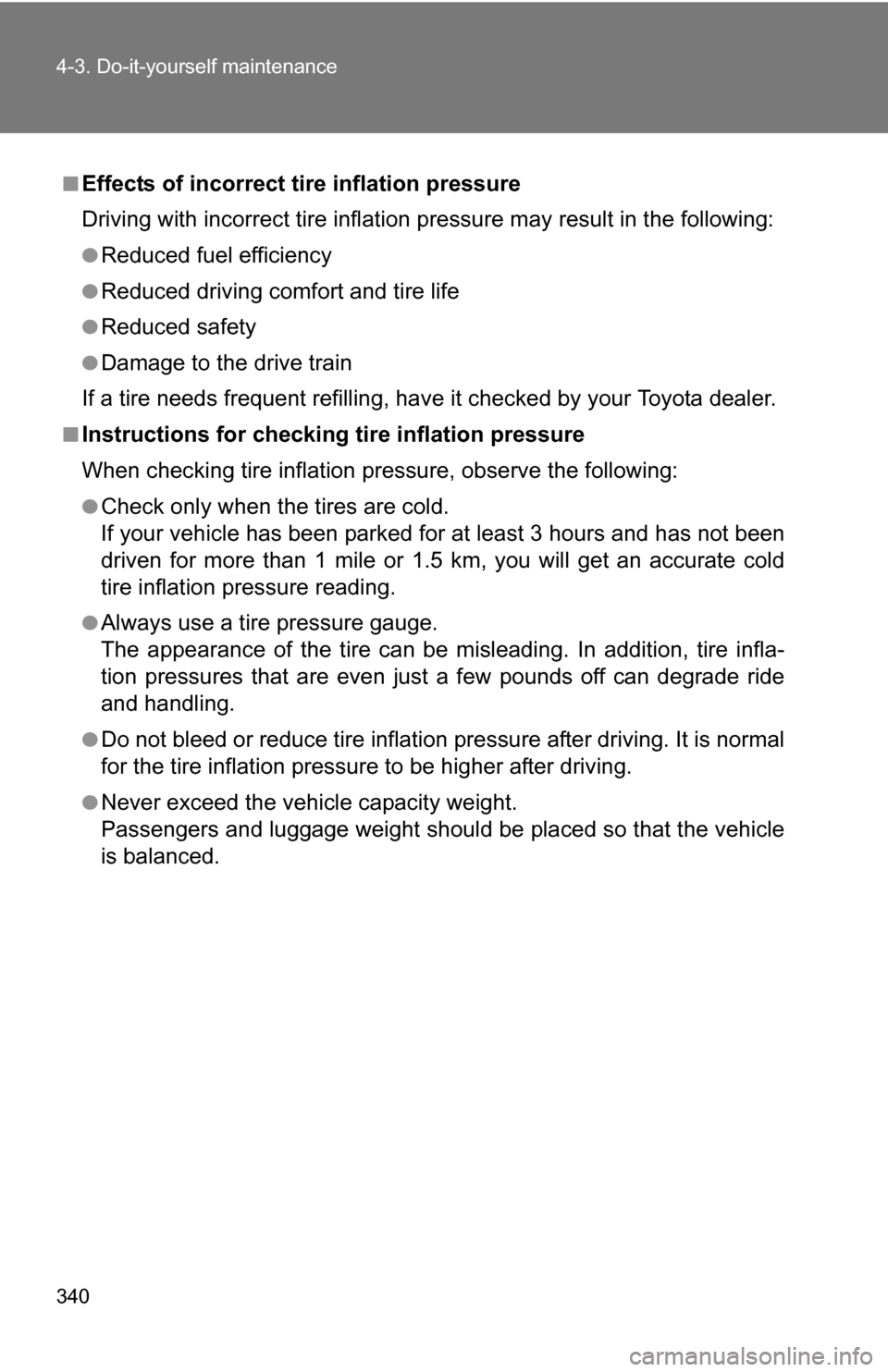
340 4-3. Do-it-yourself maintenance
■Effects of incorrect tire inflation pressure
Driving with incorrect tire inflation pressure ma y result in the following:
●Reduced fuel efficiency
●Reduced driving comfort and tire life
●Reduced safety
●Damage to the drive train
If a tire needs frequent re filling, have it checked by your Toyota dealer.
■Instructions for checking tire inflation pressure
When checking tire inflation pressure, observe the following:
●Check only when the tires are cold.
If your vehicle has been parked for at least 3 hours and has not been
driven for more than 1 mile or 1.5 km, you will get an accurate cold
tire inflation pressure reading.
●Always use a tire pressure gauge.
The appearance of the tire can be mi sleading. In addition, tire infla-
tion pressures that are even just a few pounds off can degrade ride
and handling.
●Do not bleed or reduce tire inflation pressure after driving. It is normal
for the tire inflation pressure to be higher after driving.
●Never exceed the vehicle capacity weight.
Passengers and luggage weight should be placed so that the vehicle
is balanced.
Page 358 of 476
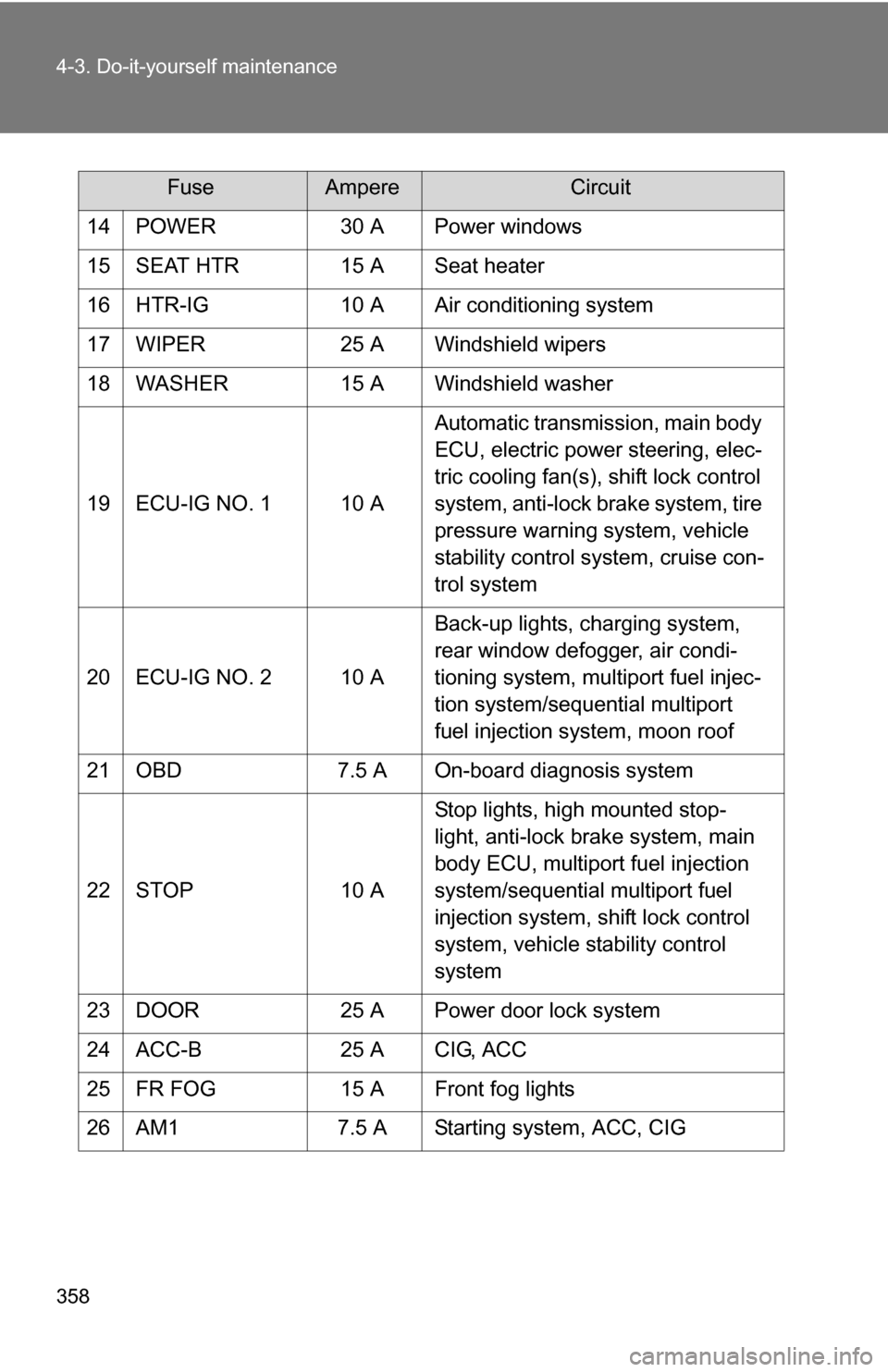
358 4-3. Do-it-yourself maintenance
14 POWER30 A Power windows
15 SEAT HTR 15 A Seat heater
16 HTR-IG 10 A Air conditioning system
17 WIPER 25 A Windshield wipers
18 WASHER 15 A Windshield washer
19 ECU-IG NO. 1 10 A Automatic transmission, main body
ECU, electric power steering, elec-
tric cooling fan(s), shift lock control
system, anti-lock brake system, tire
pressure warning system, vehicle
stability control system, cruise con-
trol system
20 ECU-IG NO. 2 10 A Back-up lights, charging system,
rear window defogger, air condi-
tioning system, multiport fuel injec-
tion system/sequential multiport
fuel injection system, moon roof
21 OBD 7.5 A On-board diagnosis system
22 STOP 10 AStop lights, high mounted stop-
light, anti-lock brake system, main
body ECU, multiport fuel injection
system/sequential multiport fuel
injection system, shift lock control
system, vehicle stability control
system
23 DOOR 25 A Power door lock system
24 ACC-B 25 A CIG, ACC
25 FR FOG 15 A Front fog lights
26 AM1 7.5 A Starting system, ACC, CIG
FuseAmpereCircuit
Page 389 of 476
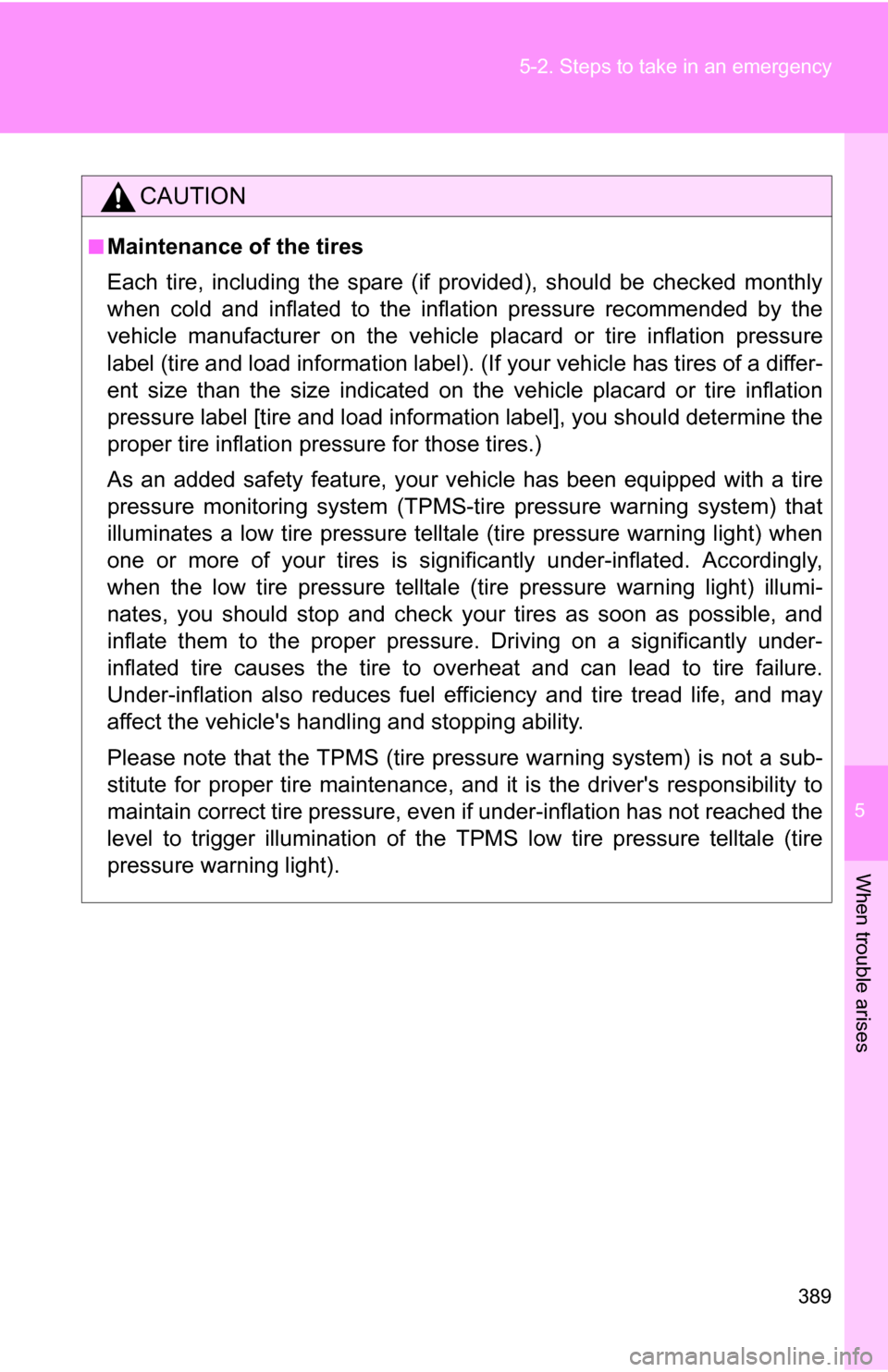
5
When trouble arises
389
5-2. Steps to take in an emergency
CAUTION
■Maintenance of the tires
Each tire, including the spare (if provided), should be checked monthly
when cold and inflated to the inflation pressure recommended by the
vehicle manufacturer on the vehicle
placard or tire inflation pressure
label (tire and load information label). (If your vehicle has tires of a differ-
ent size than the size indicated on the vehicle placard or tire inflation
pressure label [tire and load information label], you should determine the
proper tire inflation pr essure for those tires.)
As an added safety feature, your vehicle has been equipped with a tire
pressure monitoring system (TPMS-ti re pressure warning system) that
illuminates a low tire pressure telltal e (tire pressure warning light) when
one or more of your tires is significantly under-inflated. Accordingly,
when the low tire pressure telltale (tire pre ssure warning light) illumi-
nates, you should stop and check your tires as soon as possible, and
inflate them to the proper pressure. Driving on a significantly under-
inflated tire causes the tire to overheat and can lead to tire failure.
Under-inflation also reduces fuel effi ciency and tire tread life, and may
affect the vehicle's hand ling and stopping ability.
Please note that the TPMS (tire pressure warning system) is not a sub-
stitute for proper ti re maintenance, an d it is the driver's responsibility to
maintain correct tire pressure, even if under-inflation has not reached the
level to trigger illu mination of the TPMS low ti re pressure telltale (tire
pressure warning light).
Page 443 of 476
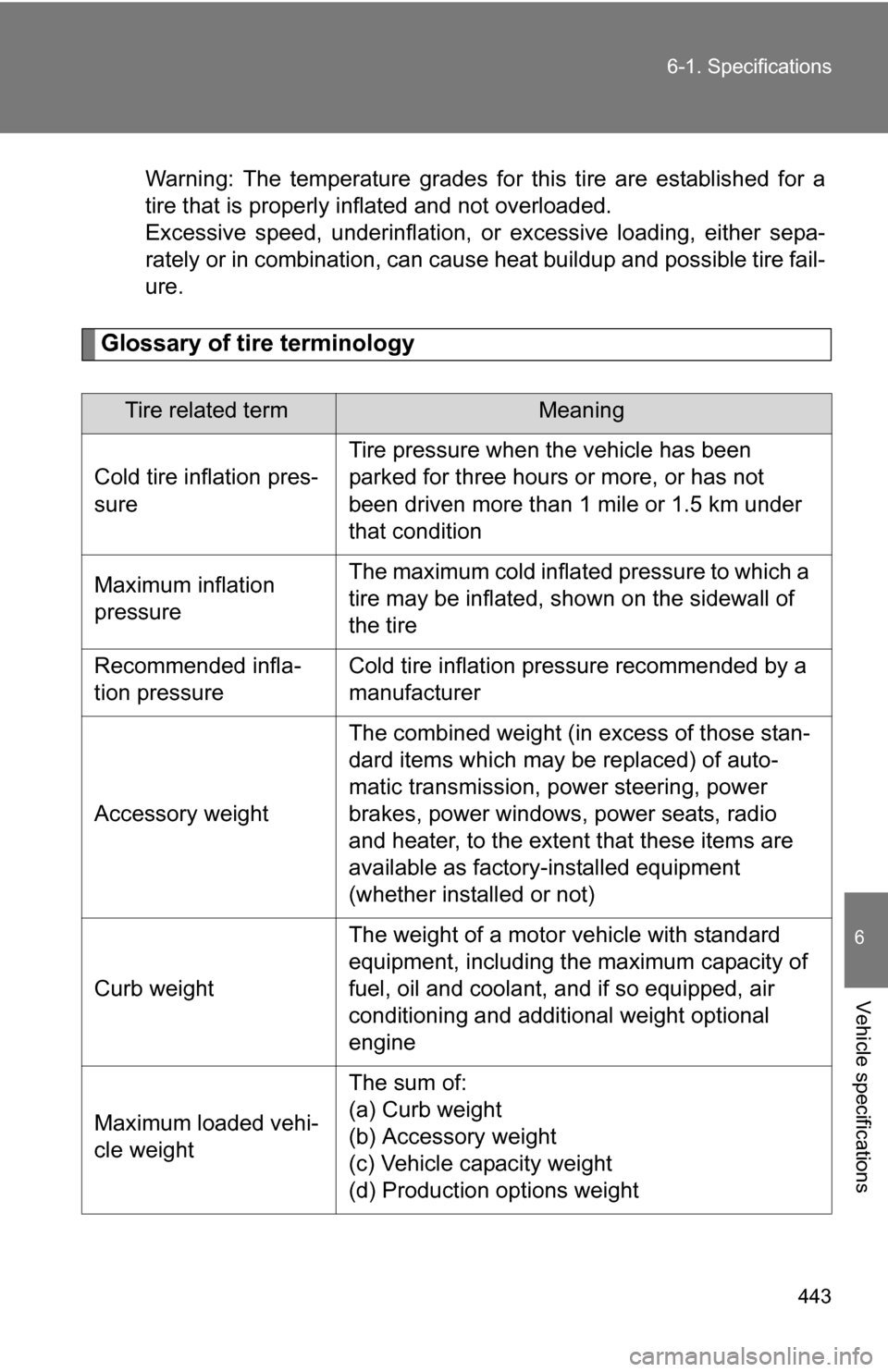
443
6-1. Specifications
6
Vehicle specifications
Warning: The temperature grades for this tire are established for a
tire that is properly inflated and not overloaded.
Excessive speed, underinflation, or
excessive loading, either sepa-
rately or in combination, can caus e heat buildup and possible tire fail-
ure.
Glossary of tire terminology
Tire related termMeaning
Cold tire inflation pres-
sure Tire pressure when the vehicle has been
parked for three hours or more, or has not
been driven more than 1 mile or 1.5 km under
that condition
Maximum inflation
pressure The maximum cold inflated
pressure to which a
tire may be inflated, s hown on the sidewall of
the tire
Recommended infla-
tion pressure Cold tire inflation pressure recommended by a
manufacturer
Accessory weight The combined weight (in excess of those stan-
dard items which may be replaced) of auto-
matic transmission, power steering, power
brakes, power windows, power seats, radio
and heater, to the extent that these items are
available as factory-installed equipment
(whether installed or not)
Curb weight The weight of a motor vehicle with standard
equipment, including the maximum capacity of
fuel, oil and coolant, and if so equipped, air
conditioning and additional weight optional
engine
Maximum loaded vehi-
cle weight The sum of:
(a) Curb weight
(b) Accessory weight
(c) Vehicle capacity weight
(d) Production options weight
Page 471 of 476

471
Alphabetical index
Tires
Chains .................................. 171
Checking .............................. 330
If you have a flat tire ............. 393
Inflation pressure .................. 338
Inflation pressure sensor ...... 331
Information ........................... 437
Replacing ............................. 393
Rotating tires ........................ 330
Size ...................................... 431
Snow tires............................. 171
Spare tire .............................. 393
Tools......................................... 393
Total load capacity .................. 170
Towing Dinghy towing ............... 183, 184
Emergency towing ................ 374
Trailer towing ........................ 175
TRAC ........................................ 163
Traction control ....................... 163
Trip information....................... 151
Trip meter................................. 143
Trunk Opener ................................... 46
Trunk light Wattage ................................ 433
Turn signal lights Replacing light bulbs ............ 360
Switch ................................... 140
Wattage ................................ 433
Valet key..................................... 20
Vanity mirrors .......................... 277
Vehicle identification number................................... 422
Vehicle stability control .......... 163
VSC ........................................... 163 Warning buzzers
Brake system ........................382
Downshifting..........................138
Seat belt reminder .................384
Warning lights
Anti-lock brake system ..........383
Brake assist system ..............383
Brake system ........................382
Charging system .... ...............382
Engine oil maintenance ......... 384
Engine oil pressure ...............382
Electric power steering system ................................383
Low fuel level ........................384
Low tire pressure warning
light .....................................384
Malfunction indicator lamp ....383
Open door .............................384
Pretensioners ........................383
Seat belt reminder light .........384
Smart key system... ...............391
SRS airbags ..........................383
Tire pressure warning light ....384
Washer fluid ..........................384
V
W